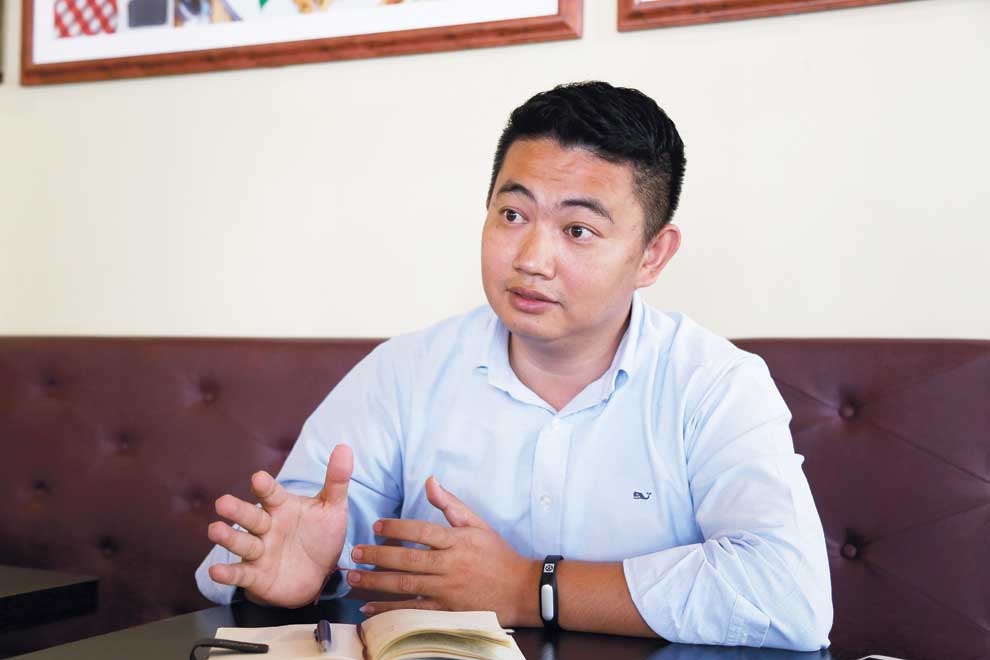
Heng Sengly, general manager of Park Cafe, speaks to The Post in Phnom Penh last week.
The food and beverage industry has seen explosive growth in recent years, with new brands entering the market and existing chains continue to expand. The Post’s Hor Kimsay sat down with Heng Sengly, general manager of Park Cafe, to discuss the F&B industry’s growth the company’s strategy to navigate an increasingly saturated market.
Who are the people behind Park Cafe?
Park Cafe was founded by a group of local businesspeople and now has investments from a foreign company. Local investors hold 70 percent of shares while the rest of the company belongs to Singapore-registered Emerging Market Investment (EMI).
How has Park Cafe grown since opening in 2004?
In 2004, we had just one branch, but today we have 10 branches throughout the city providing jobs to around 350 Cambodians. Our customer numbers have also been growing by 30 percent annually, going from 2,000 daily customers in 2014 to nearly 3,000 per day currently.
Last year we received a total of 1 million clients who spent $5 to $7 on average per visit. We already have several new outlets planned, and we will look to establish a few more this year.
The food and beverage sector has also grown rapidly since 2004, especially during the past two years. What are your thoughts on this growth?
The number of food outlets and coffeeshops has increased very rapidly, particularly in Aeon Mall, as well as Boeung Keng Kang 1 and Tuol Kork. The sector’s development has attracted international restaurant chains to enter the Cambodian market, which has also led to a rapid increase in franchising deals. However, I believe that some businesses are growing in an unsustainable way without taking into account the risks.
I think the growth of coffee and beverage outlets is becoming a bubble that could easily burst.
Many of these outlets target younger customers. What do you think of this strategy?
It is a high-risk business model because most teenagers follow the habits of others and they are always looking to try something new. This means it is a rapidly changing market that requires a lot of flexibility in order to be
successful.
How does the F&B sector’s rapid growth affect Park Cafe’s business?
It does not affect us significantly because we target a different segment of customers. Park Cafe targets middle-aged customers, such as businessmen, civil servants and private sector employees. However, the strong growth of foreign brands in Cambodia has impacted our plans to start selling franchises. It has forced us to be more cautious and to be more efficient in our operations.
Last year Park Cafe announced it would sell franchises. How is that going?
We have not sold any franchises yet because we are more focused on growing in terms of quality rather than quantity.
So far, we have more than 20 candidates that have applied to buy franchises, but with the current market conditions, we are creating tighter quality requirements for our franchisees.
We are adopting a slower growth strategy that we are sure will pay off going forward. We won’t open any more stores unless we are sure that they will be profitable and sustainable. When looking at potential franchisees, we are not only interested in their financial means, but we also look for experience and a strong commitment to our brand.
What are your thoughts on the rapid growth of franchise sales from other brands?
I’ve observed that some operators focus solely on quantity when they sell franchises.
For example, some companies will agree to a franchise even though the location does not have the potential for strong growth. A lot of franchise owners have sufficient capital, but don’t have enough experience in running a quality business. Already in the past two or three years we have seen some drink brands enjoy rapid growth and then disappear from the market. The current growth is showing signs of a bubble. Once it bursts, everyone in the market will be forced to operate with more vigilance.
This interview has been edited for length and clarity.
Contact PhnomPenh Post for full article
Post Media Co LtdThe Elements Condominium, Level 7
Hun Sen Boulevard
Phum Tuol Roka III
Sangkat Chak Angre Krom, Khan Meanchey
12353 Phnom Penh
Cambodia
Telegram: 092 555 741
Email: [email protected]












